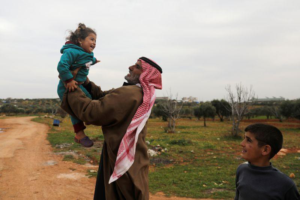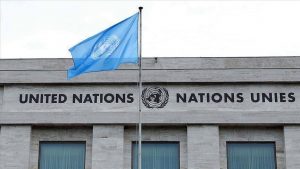The ICC Trial Chamber issued a reparation order against Dominic Ongwen for EUR 52.4 million on February 28, 2024.
The order benefits the victims of the crimes for which Ongwen was convicted at the ICC. The reparations are of three modalities.
First, EUR 750 in cash to each victim as a symbolic measure to recognise the harm they suffered.
Second, rehabilitation services to address physical, moral, or material injuries. Some examples of rehabilitation could be medical treatment and psychological counselling and socioeconomic rehabilitation, such as income-generating initiative. Finally, symbolic and satisfaction measures, including the memorialisation of the victims and survivors and of the events.
How many victims of the Dominic Ongwen crimes are eligible for the potential reparations and how much are they being awarded?
The reparation order covers one, individuals harmed in attacks for which Ongwen was convicted in four IDP camps, namely Abok, Lukodi, Odek, and Pajule; second, victims in other localities who suffered sexual and gender-based violence; third, individuals who, as children, were recruited or used in the militia of Ongwen, and lastly children born out of rape.
The ICC Judges consider that at least 49,772 individuals, who are direct or indirect victims, may be beneficiaries of reparations, including those of the 4,095 victims who were able to participate during the trial.
Once the reparation process is launched, victims will be contacted by the ICC to provide their information, and the Court will then review their applications.
What challenges does the TFV foresee in implementing the reparations to the victims of the Dominic Ongwen case?
We know that victims want the reparation programme to be a success. The Court and the Trust Fund for Victims also want that. But it will take time for the Court to set up all the activities to make reparations happen and victims will need to wait for some time.
It will be essential to communicate with victims throughout the whole process and to find the best ways to ensure all victims receive information and understand why they may need to wait.
Another challenge at the ICC Trust Fund for Victims is obtaining the necessary funding to cover the reparation because Ongwen does not have money to pay for the order. Some victims will have to wait more than others.
As mandated by the judges, the victims in dire need will be prioritised in the process. Last month, the TFV launched an urgent appeal of EUR 5 million to address the victims’ urgent needs and vulnerability in line with the prioritisation provided for in the Reparations Order.
After fulfilling this first funding appeal, the Trust Fund for Victims wants to mobilise at least EUR 5 million annually to implement the Ongwen Reparation Order progressively.
This year, the Judges will decide on the general plan for the reparation programme. This decision will provide a clear roadmap for the future of the programme, keeping all potential beneficiaries and stakeholders informed and involved.
What role are the local community organisations playing in the reparations process?
Local community organisations play a crucial role in the reparations process by facilitating consultations and dialogue with victims, amplifying their voices, and demanding safe spaces for affected communities to share experiences and demands. They will actively monitor the reparations process to ensure it is meaningful, victim-centred, and transparent.
Their involvement ensures that the reparations process is culturally appropriate and effectively addresses the specific needs of the victims.
An ongoing consultation process with victims and communities will be put in place throughout the implementation of reparations.
If local organisations have special capabilities to deliver services as part of the reparation programme they can also apply to be considered as implementing partners. The Trust Fund for Victims selects implementing partners on the basis of a strict competitive process, which complies with the ICC Financial Rules and Regulations.
How are the psychological and emotional needs of victims being addressed in the reparation’s framework by the TFV?
The Trust Fund for Victims has assessed the psychological impact and emotional needs of victims of crimes across Northern Uganda, and of the importance of addressing these to increase the quality of life and the prosperity of individuals and communities.
In the Ongwen reparation order, the ICC judges recognised that the harm caused to victims includes moral harm, which covers psychiatric and psychological health and comprises also stigma suffered in communities by many of them.
The order asked the TFV to develop activities to address psychological and emotional needs. We have met more than 2,700 victims since February 2024 when the order was issued and we heard how important it is for victims to receive psychological treatment.
Also, there is the element of recognition throughout all activities. In a tangible manner, the cash payment is a measure of recognition.
Memorialisation activities will also contribute to emotional and psychological well-being.
And by participating in the programme, victims will also strengthen their social connections and ties to their communities.
How are you handling ‘do no harm’ and avoiding the re-traumatisation of victims in the reparation process?
The Rome Statute, which is the international treaty that created the ICC, requires judges to establish principles of reparations, and one such principle is “do no harm” This principle is recognised again in the Ongwen Reparation Order.
The TFV received a concrete instruction from the Judges requiring us to “ensure that consultations are conducted in compliance with the Principles on Reparations, as adopted in this Order, including the ‘do no harm’ principle, guarantee accessibility and meaningful participation of victims, respect for their diversity as to their particular needs and interests, including gender-specific considerations, and take into account any obstacles victims may face in coming forward and expressing their views.”
In addition, during the implementation of reparations, for the TFV it means that we must anticipate, monitor, and address the potential or unintended negative effects of our actions.
TFV is mandated to integrate “do no harm” principle by meticulously crafting and executing reparations programs that prioritise the needs and vulnerabilities of the victims. This involves robust measures to prevent re-traumatisation, including providing trauma-informed care, ensuring strict confidentiality, and actively involving victims in the planning and decision-making processes to uphold their agency and dignity.
What measures are being taken by TFV to monitor and evaluate the effectiveness of the reparations program over time?
The TFV has a framework of indicators to monitor the performance and impact of the programme.
Day to day, we monitor that our activities are done on time and with quality. We ensure that staff and implementing partners follow strict financial guidelines to avoid fraud and misuse of the funds that need to reach the victims.
During the implementing we regularly consult with victims and listen to their stories of change. We have feedback mechanisms to also hear when things are not going well.
For long term impact, the TFV commissions external independent evaluations.
Are there any other cases whereby TFV is currently conducting reparations?
The TFV has conducted reparations in 4 other cases, in the Democratic Republic of the Congo and in Mali and we implement programmes of assistance in 7 countries. The Ongwen reparation programme will be largest programme implemented by the TFV to date.
One reparation programme has already been completed, the Katanga case which benefitted individuals who lost family members, who suffered physical and psychological harm, and who lost their homes, property and livestock as a result of the attack in 2003 on the village of Bogoro in Ituri Province, DRC, for which Katanga was convicted and held liable as an accessory by the ICC. The liability of Katanga was USD 1 million.
It was the first time that the implementation of reparations ordered by the judges in an International Criminal Court case has been completed.
In the Al Mahdi case in Mali, the Trust Fund is implementing a programme concerning the destruction of cultural heritage property, which is a war crime.
The programme includes reconstructing the Mausolea of Timbuktu, memorialising events, granting individual reparations, and supporting the economic revitalisation of the community of Timbuktu. The reparation in this case is €2.7 million.
In the DRC also, the Trust Fund is implementing a programme for more than 3,000 child soldiers and thousands of victims of attacks including of sexual violence, related to the Lubanga and Ntaganda cases.
We also implement programmes of assistance in seven situation countries where the ICC is investigating but there are no cases with reparation orders.
Are there any success stories or notable examples of how other reparations have positively impacted the lives of victims, from the work of TFV?
Yes, there are several success stories from the work of the TFV. An independent evaluation of the Katanga reparation programme provides evidence of increased resilience and trust in institutions from victims that participated in the reparation programme, as well as enhanced psychological well-being.
In the Lubanga case from the DRC, former child soldiers received reparations that included educational support, vocational training, and psychosocial counselling. These measures have helped many victims reintegrate into their communities, gain new skills, and take on business projects to ensure an income.
We also have Richard’s story in Uganda, who was a victim of a landmine in 2003 and lost his right leg. He participated in the TFV assistance programme in Gulu. He has been able to speak about his traumatic experience throughout his counselling therapy with a social worker assigned to him and he also benefitted from medical treatment that included receiving an artificial limb. Today, Richard is a thriving farmer, providing for his family and leading a group of landmine survivors in his sub-county with passion and dedication, a testament to the success of our programs.
Another story that I can share is Robert’s in Ituri, in the DRC. When he was 12 years old he was forcibly enrolled in a militia group for over four months. His parents managed to exchange his release for a ransom. Despite his efforts to live an everyday life, he was traumatised and had to leave school.
When he was informed that he would receive reparation awards in the Lubanga case, he was enrolled in psychological therapy and medical care and received training in culinary arts.
Because of the therapy and his efforts he completed his studies and an internship.
He used the money he received as part of the reparations to purchase a motorcycle to create a second source of income (motorcycle taxi) in addition to his job as a cook. He now lives independently thanks to his work as a cook and the extra income from his motorcycle-taxi activity. He provides for his needs and takes care of his family.
No one can give back to survivors what they lost as a result of the crimes committed against them. This is why it is important to prevent and to stop such crimes from being committed.
But if they have happened, justice is the instrument to tell us who did it, and through reparations to help reconstruct what was once whole. Justice is hope, and with hope, communities and individuals can always prosper again.
Dr Ruiz Verduzco




